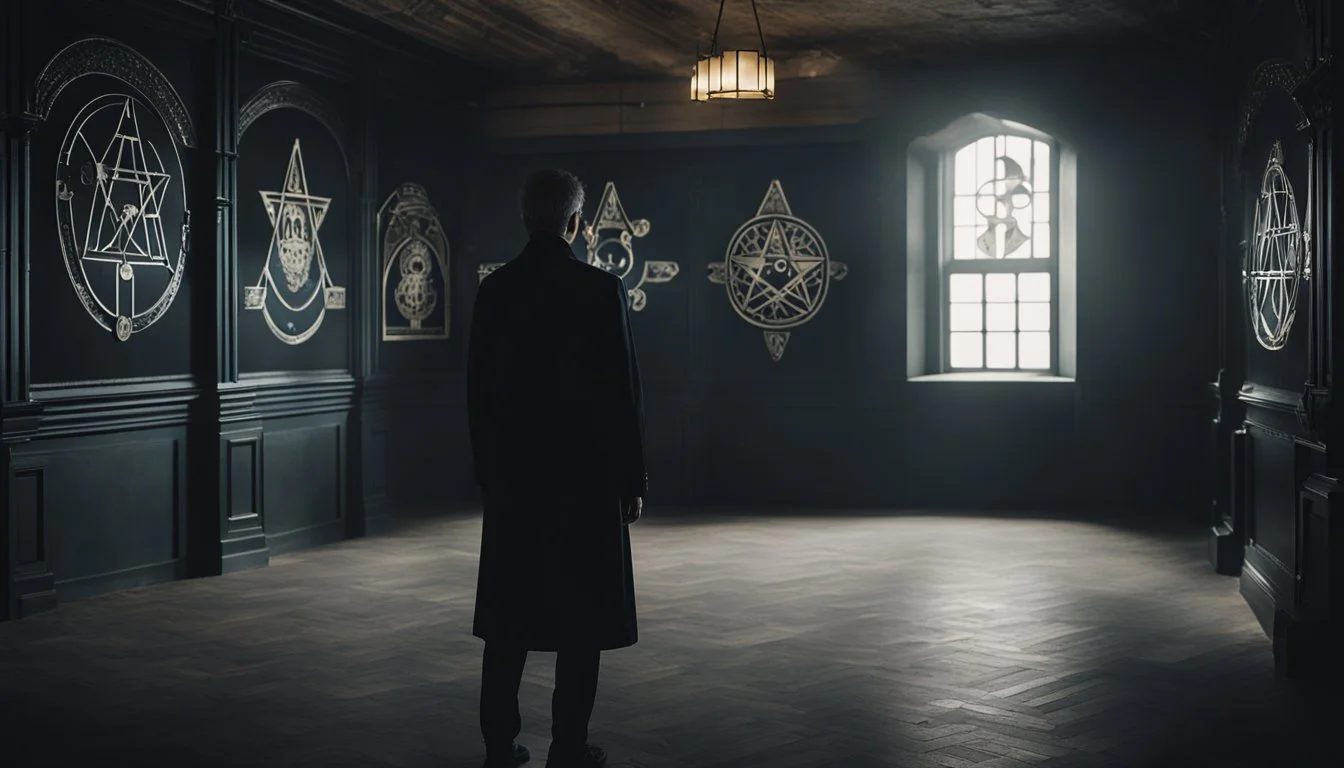7 True Crime Documentaries About Cult Leaders and Their Followers
A Deep Dive into Manipulation and Devotion
True crime documentaries exploring cult leaders and their followers delve into some of the most fascinating and disturbing facets of human behavior. These films and series often uncover the psychological manipulation, charismatic leadership, and blind devotion that lead individuals to commit unthinkable acts. Through real-life accounts, interviews, and in-depth research, these documentaries provide a chilling insight into the minds of cult leaders and the experiences of their followers.
Understanding the complex dynamics within cults is crucial for comprehending the impact these groups have on individuals and society. True crime documentaries serve as a critical resource, offering viewers a chance to learn about the warning signs and consequences of cult involvement. By shedding light on these dark corners of human psychology, these films not only educate but also offer a gripping viewing experience.
1) Wild Wild Country (2018)
"Wild Wild Country" is a documentary series on Netflix about the Indian guru Bhagwan Shree Rajneesh, also known as Osho.
The series examines Rajneesh's controversial commune, Rajneeshpuram, established in Wasco County, Oregon, during the early 1980s. Rajneesh's followers, known as sannyasins, transformed the rural area, drawing attention and concern from local residents.
The series focuses on the intense and often troubling events that unfolded, including legal battles, immigration fraud, and a bioterror attack. Rajneesh's personal assistant, Ma Anand Sheela, emerges as a key figure in the community's rise and fall.
Filmmakers Chapman and Maclain Way spent four years creating the series, which premiered at the Sundance Film Festival before its release on Netflix.
"Wild Wild Country" is notable for its extensive archival footage and interviews with former members, providing a comprehensive look at a dramatic period of U.S. history.
For more information, visit the Wikipedia page.
2) The Vow (2020)
"The Vow" is an American true crime documentary series directed by Jehane Noujaim and Karim Amer. This nine-episode HBO docuseries sheds light on the controversial NXIVM cult, led by Keith Raniere.
The series premiered on August 23, 2020. It delves into the group's practices and the experiences of former members.
The narrative focuses on the journey of those who left NXIVM, revealing troubling details about the organization's inner workings. These accounts include allegations of sexual slavery and manipulation.
Key figures in the documentary include former NXIVM members like Vicente and Sarah Edmonson. Their testimonies provide critical insights into the cult's hierarchical structure and the psychological control exerted by its leaders.
The series was renewed for a second season, which began airing on October 17, 2022. This continuation delves deeper into the legal proceedings and the aftermath of the initial revelations.
For more information on "The Vow," visit Wikipedia.
3) Holy Hell (2016)
"Holy Hell" is a documentary by Will Allen that focuses on the Buddhafield cult. Will Allen spent 22 years in the group, documenting their daily lives as the cult’s videographer.
The film delves into the rise of the group's charismatic leader, Michel. Known by several names, Michel is accused of manipulating and abusing his followers.
Interviews with former members provide personal accounts of their experiences. The film combines old footage Allen shot with new interviews to reveal the group's darker side.
This mix of past and present footage offers a chilling view into the inner workings of the cult. The documentary paints a detailed picture of how members were psychologically controlled.
Michel eventually relocated to Hawaii, where he continues to lead a small group of followers. The documentary raises important questions about the nature of charisma and power.
More information on "Holy Hell"
4) Children of God (1994)
Children of God, a documentary aired on Britain's Channel Four in 1994, provides a haunting look into a family within the controversial organization known as Children of God.
This group, often described as a cult, has been widely criticized for its unsettling practices, which include abusive treatment described by former members.
The film highlights personal testimonies and experiences, offering a gripping inside view of the psychological and physical control exerted by the group’s leaders.
For further reading, visit Children of God on IMDb.
5) Jonestown: The Life and Death of Peoples Temple (2006)
This documentary covers the tragic events that unfolded in Jonestown, Guyana in 1978. Led by Reverend Jim Jones, more than 900 members of the Peoples Temple died in a mass murder-suicide, which remains one of the largest such acts in history.
The film incorporates never-before-seen footage, offering a penetrating look at the inner workings of the Peoples Temple. It highlights the charismatic leadership of Jim Jones and the devastating impact of his manipulative control over his followers.
Through interviews with survivors, Temple defectors, and journalists, the documentary provides a comprehensive account of how the tragedy unfolded. Eyewitness stories and historical context make the viewer understand the gravity of the situation.
Winner of several awards, this film was directed by Stanley Nelson and stands as a significant portrayal of one of modern history's most shocking events.
Learn more about the documentary here.
6) Waco: Madman or Messiah? (2018)
"Waco: Madman or Messiah" is a documentary mini-series that delves into the life and controversial reign of David Koresh, the leader of the Branch Davidians.
The series uses survivor testimonies, news clips, and audio recordings to detail Koresh's rise from a self-proclaimed prophet to a figure at the center of a deadly standoff with federal authorities.
Koresh's leadership culminated in a catastrophic 51-day siege by the FBI that ended in tragedy. This event remains one of the most infamous confrontations between a cult leader and the government.
The documentary provides a thorough examination of the psychological and social dynamics within the Branch Davidians, offering insights into how Koresh maintained control over his followers.
It also delves into the controversial tactics used by law enforcement, which continue to spark debates among critics and supporters alike.
For further information, visit IMDb.
7) The Family
"The Family" (2016) is a documentary that delves into the enigmatic and disturbing activities of the Australian cult led by Anne Hamilton-Byrne. Hamilton-Byrne believed herself to be the reincarnation of Jesus Christ and established a community based on her idiosyncratic views.
The group, which started in the 1960s, was notorious for kidnapping children and raising them as her own. The children were subjected to cruel and abusive treatments, including severe punishments and mind-altering drugs.
Hamilton-Byrne maintained strict control over the group, using manipulation and intimidation to keep members obedient. The indoctrination was so intense that many followers believed in her supposed divine status without question.
The documentary provides a harrowing account of the long-lasting psychological impact on the children and other members. Survivors recount their traumatic experiences, shedding light on the inner workings of Hamilton-Byrne's reign of terror.
For more information on "The Family," visit Wikipedia or IMDB
Understanding Cult Dynamics
Cult dynamics often involve sophisticated methods of psychological manipulation and the use of groupthink to maintain control and conformity among followers.
Psychological Manipulation
Cult leaders expertly employ psychological manipulation to control their followers. Techniques like love bombing—showering new recruits with affection and attention—create a sense of belonging and loyalty.
Charismatic authority plays a central role, where leaders are seen as nearly divine figures, making their demands more compelling.
Isolation from the outside world is another tactic, heightening dependence on the group for emotional and social needs. This isolation can include physical separation or limiting access to information. Fear and guilt are also leveraged, often through threats of punishment or promises of disaster if leaders' directions are not followed.
Cognitive dissonance makes followers rationalize behaviors that contradict their values or beliefs, ensuring compliance even in extreme circumstances.
Groupthink And Conformity
Groupthink is a powerful tool for cult leaders, compelling members to prioritize group harmony over personal dissent. This phenomenon fosters a collective mindset that discourages critical thinking.
Within cults, pressure to conform is immense. Uniformity in behavior and thought is often enforced through rituals or daily practices.
Dissenters face ostracism or punishment, reinforcing the importance of compliance. Peer pressure is another significant factor, with established members modeling the desired behavior for newer recruits.
Cults also create an us vs. them mentality, demonizing outsiders to solidify internal bonds. This boundary marks anyone questioning the group’s tenets as an enemy, thus preventing defections and maintaining a cohesive unit.
The Role Of The Cult Leader
Cult leaders play a pivotal role in shaping the dynamics and operations within a cult. They often exhibit a combination of charisma and authoritarian tactics that ensure their control over followers.
Charisma And Authority
Charismatic leaders possess persuasive traits that draw people towards them. Their charm and rhetoric create an aura of importance, making followers feel unique and valued. They project confidence and visionary ideas, often portraying themselves as saviors or enlightened beings. This charisma is essential in establishing a strong emotional bond with their followers, which is pivotal for maintaining control.
People are typically attracted to the leader's magnetic personality. These leaders often promise solutions to personal and societal issues, presenting themselves as the only means to achieve a better life. Their authority stems from their perceived wisdom and capability, giving them a god-like status among followers. This blend of charisma and perceived authority ensures that followers remain loyal and obedient.
Tactics Of Domination
Cult leaders employ various tactics to maintain their control and influence over members. Isolation is a common method, where followers are separated from family and friends. This makes them more reliant on the leader and the cult for support. Psychological manipulation, such as indoctrination and gaslighting, keeps members in a state of confusion and dependency.
Leaders also employ fear and punishment to enforce rules and discourage dissent. They create an environment where any form of questioning is met with severe consequences. By establishing a hierarchical structure, the leader places themselves at the top, ensuring that their commands are followed without question. Financial and emotional exploitation are often used to further entrap followers, exhausting their resources and willpower, making it difficult for them to leave the cult.
Impact On Followers
True crime documentaries reveal the deep and often tragic effects cults have on their followers. These impacts can range from physical and emotional distress to the long and challenging journey of recovery and rehabilitation.
Physical And Emotional Toll
Followers of cult leaders often endure severe physical and emotional strain. Physical abuse may include forced labor, sleep deprivation, and even violence. This abuse can lead to chronic health issues and long-term disabilities.
Emotional tolls are equally devastating. Followers face manipulation, psychological conditioning, and isolation from loved ones. This can result in anxiety, depression, and post-traumatic stress disorder (PTSD). Cult leaders employ tactics that destroy self-esteem, making followers feel dependent and powerless.
In documentaries like Holy Hell, firsthand accounts showcase the extreme effects, highlighting how these experiences disrupt lives. The control over personal freedoms and mental well-being leaves lasting scars, often necessitating professional intervention.
Recovery And Rehabilitation
Recovering from the influence of a cult leader is a complex and lengthy process. Followers need extensive psychological counseling to address trauma and rebuild their sense of self. Support groups and former members offer critical insights into regaining independence.
Therapeutic approaches often include cognitive-behavioral therapy (CBT) to counteract indoctrinated beliefs and establish healthy thought patterns. Family therapy can help mend broken relationships and provide a strong support system.
Educational and employment assistance are essential. Special programs aim to reintegrate individuals into society by teaching life skills and providing job training. Documentaries like The Vow illustrate these recovery processes, emphasizing the need for a holistic approach to rehabilitation.





